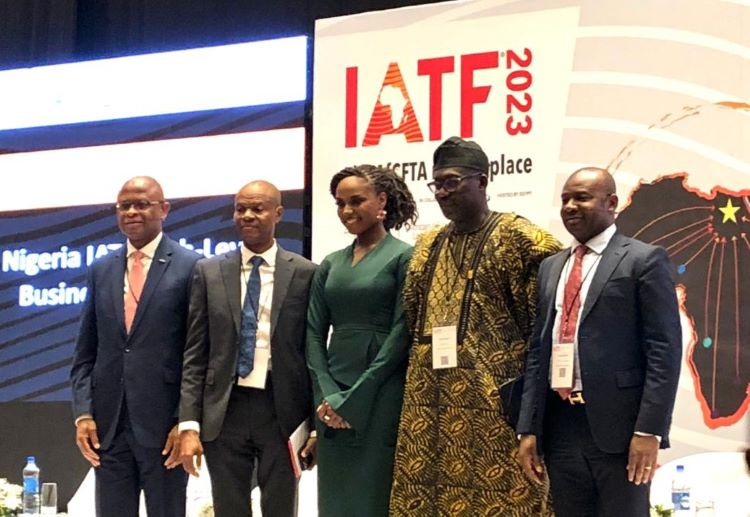
 Trade experts have emphasised the need to boost Nigeria’s productive and manufacturing capacity to facilitate trade, improve foreign exchange inflows and engender competitiveness under the Africa Continental Free Trade Area (AfCFTA).
Trade experts have emphasised the need to boost Nigeria’s productive and manufacturing capacity to facilitate trade, improve foreign exchange inflows and engender competitiveness under the Africa Continental Free Trade Area (AfCFTA).
They spoke at a panel session of the 2023 Intra-African Trade Fair (IATF2023) Roadshow Nigeria with theme: “Growing Intra-African Trade amidst Increasing Regional and Global Geopolitical Challenges” on Monday in Lagos.
BRANDPOWER reports that IATF2023, scheduled for Nov. 9 to Nov. 15 in Cairo, Egypt, is organised by the African Export-Import Bank (Afreximbank), African Union Commission and the AfCFTA Secretariat.
The event is a platform for businesses to access an integrated African market of over 1.3 billion people with a Gross Domestic Product (GDP) of over 3.5 trillion dollars created under the AfCFTA.
Mr Intong Eric Monchu, Regional Chief Operating Officer, Anglophone West Africa, Afreximbank, stated that AfCFTA’s implementation remained a critical arrowhead of the bank’s strategy to drive Africa’s economic integration.
Monchu, noting that the continent was blessed with abundant natural resources, observed that Intra-African trade level was pegged at 18 per cent; a very low value when compared with that of Europe and Asia.
He stated that Nigeria’s current export of raw commodities needed improvements and said that the Afreximbank was committed to supporting solutions tailored toward facilitating trade across the continent.
“Nigeria tops country to drive intra African trade because they have what it takes in the way they think, reason, drive, aggressiveness to move Intra-African trade.
“We must, therefore, stop being last in terms of trade while Afreximbank works to promote special economic zones, industrial parks with states and countries across the continent,” he said.
Engr Mansur Ahmed, Immediate Past President, Manufacturers Association of Nigeria (MAN), noted that the real cause of Africa’s failure was the inability to keep up productive manufacturing capacity.
Ahmed said the country needed to trade in manufactured goods, produce what is needed for consumption and also what is needed for exportation.
He lauded the Afreximbank for its efforts in creating financing systems and urged the bank to focus on promoting manufacturing.
Mr Olukayode Pitan, Managing Director, Bank of Industry (BOI), noted that one clear challenge affecting the Nigerian economy was the absence of enough diversification.
Pitan, represented by Mr Leonard Kange, Divisional Head, Corporate, BOI, stressed the need for depth to diversify the country’s revenue, noting the volatility that accompanied its dependent on oil.
He noted that opportunities existed to earn foreign exchange in manufacturing sectors such as motor parts and cars, iron and steel, plastics, textile, energy, agriculture running into billion of dollars.
“As it is, Nigeria is exporting money and importing poverty and so it has become very important to support and develop our industrial base to drive economic growth and development.
“With the opportunities in manufacturing, it is glaring that the market is there and so we must do what is needed to take advantage of this market to begin to earn the much needed foreign exchange,” he said.
Mr Segun Ajayi-Kadir, Director-General, MAN, said the lending rate of credit funding to manufacturers was quite high, hindering competitiveness.
He added that the challenges of power, ability to scale, transportation and logistics, infrastructure, bureaucratic bottlenecks beguiled manufacturing.
“When extrapolated to the continent, the situation is not so different and until individual countries address these constraints, Intra-African trade may be difficult,” he said.
Mr Olatayo Omodiji, Head, Strategic and Corporate Communications, Nigeria Export Import Bank, said the reason for low Africa trade was because trade was more in primary commodities.
He noted that the composition of trade globally was mainly manufactured finished products and so that starting point would be to add value to raw material.
BRANDPOWER reports that Omodiji also emphasised the need to develop infrastructure and technology for manufacturing to compete globally.
“Nigeria also needs to address issues of informal trade by getting Micro, Small and Medium Enterprises (MSME) to be part of formal structure to grow trade.
“We must add value to agricultural products such as cocoa, leather, nuts, crude to boost trade while Nigerians work on their psyche to adopt Made In Nigeria goods massively,” he said.
Mr Emeka Uzomba, Senior Advisor, AfCFTA, Afreximbank, describing AfCFTA as the most developmental tool for Africa, urged the private sector to organise themselves to harness its opportunities.
He said some of the bank’s intervention tools included financing and equity risks to support development of industrial parks and special economic zones across Africa.
He pledged the bank’s support to providing more interventions tailored to drive MSME participation and growth under the AfCFTA.






















